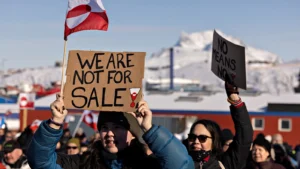Following the recent arrest of Istanbul’s mayor, Ekrem İmamoğlu, significant unrest and protests have erupted across Turkey, revealing strong political divides and fears for the future of the nation’s democratic trajectory. Mayor İmamoğlu is a member of the opposition Republican People’s Party (CHP) and was detained on March 19, 2025, due to alleged charges of corruption and connections to terrorist organizations.
Background and Arrest
Serving as Istanbul’s mayor since 2019, İmamoğlu emerged as a strong challenger to President Recep Erdoğan’s dominance. Erdoğan is the head of the Justice and Development Party (AKP), however, the mayor’s electoral victories in both 2019 and 2024 seemed to notably undermine this dominance. In March 2025, İmamoğlu and 100 other individuals, including journalists and business figures, were arrested following accusations of corruption, extortion, bribery, and support for the Kurdistan Workers’ Party (PKK), which Turkey considers to be a terrorist organization. However, many regard this arrest as an attempt to sideline a rival, with it occurring just days before the opposition’s presidential primary..
Public Protests
Following the arrest, widespread protests broke out, with thousands taking to the streets of Istanbul, Ankara, and İzmir. For many, the detention represents an assault on democratic principles and goes against government-imposed bans on public gatherings. Large crowds congregated outside municipal offices, calling Erdoğan a “dictator” and assuring İmamoğlu that “he is not alone.” This led to various clashes with the police, who employed tear gas and water cannons in an attempt to disperse the crowd.
Government Response
The protests have been met with a robust response from the President and his administration. Nearly 1,900 individuals have been detained since the onset of the protests, including students, journalists, and activists. The government has also restricted access to social media platforms, and broadcasting bans have been imposed on media outlets that are not affiliated with the government. Erdoğan has accused the opposition of trying to undermine the economy, guaranteeing that these demonstrations and acts of sabotage will face judicial repercussions.
International Reaction
Throughout the international community, there is widespread concern regarding the mayor’s arrest and the protests. The Council of Europe and Human Rights Watch (HRW) condemned the arrest due to its violation of democratic principles and the will of Turkish people. Many European leaders have urged the Turkish government to uphold human rights and the rule of law. However, the majority of the international responses have been too muted.
Economic Implications
In the wake of this political turmoil, Turkey is facing various economic challenges. The Turkish lira has fallen to its lowest level ever recorded, plunging the country into an economic crisis and prompting some investors to withdraw. The President’s opposition has hence accused him of undermining economic stability by focusing on authoritarian actions. In response, Erdoğan claims that the protests are to blame for the economic downturn
Looking Ahead
The path forward now seems quite uncertain. CHP insists on peaceful demonstrations and is trying to implement legal avenues to challenge the mayor’s detention. Observers, both domestic and international, are closely monitoring the situation, concerned about the implications on Turkey’s democracy and stability.






